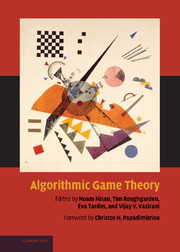Book contents
- Frontmatter
- Contents
- Foreword
- Preface
- Contributors
- I Computing in Games
- II Algorithmic Mechanism Design
- 9 Introduction to Mechanism Design (for Computer Scientists)
- 10 Mechanism Design without Money
- 11 Combinatorial Auctions
- 12 Computationally Efficient Approximation Mechanisms
- 13 Profit Maximization in Mechanism Design
- 14 Distributed Algorithmic Mechanism Design
- 15 Cost Sharing
- 16 Online Mechanisms
- III Quantifying the Inefficiency of Equilibria
- IV Additional Topics
- Index
11 - Combinatorial Auctions
from II - Algorithmic Mechanism Design
Published online by Cambridge University Press: 31 January 2011
- Frontmatter
- Contents
- Foreword
- Preface
- Contributors
- I Computing in Games
- II Algorithmic Mechanism Design
- 9 Introduction to Mechanism Design (for Computer Scientists)
- 10 Mechanism Design without Money
- 11 Combinatorial Auctions
- 12 Computationally Efficient Approximation Mechanisms
- 13 Profit Maximization in Mechanism Design
- 14 Distributed Algorithmic Mechanism Design
- 15 Cost Sharing
- 16 Online Mechanisms
- III Quantifying the Inefficiency of Equilibria
- IV Additional Topics
- Index
Summary
Abstract
In combinatorial auctions, a large number of items are auctioned concurrently and bidders are allowed to express preferences on bundles of items. This is preferable to selling each item separately when there are dependencies between the different items. This problem has direct applications, may be viewed as a general abstraction of complex resource allocation, and is the paradigmatic problem on the interface of economics and computer science. We give a brief survey of this field, concentrating on theoretical treatment.
Introduction
A large part of computer science as well as a large part of economics may be viewed as addressing the “allocation problem”: how should we allocate “resources” among the different possible uses of these resources. An auction of a single item may be viewed as a simple abstraction of this question: we have a single indivisible resource, and two (or more) players desire using it – who should get it? Being such a simple and general abstraction explains the pivotal role of simple auctions in mechanism design theory.
From a similar point of view, “combinatorial auctions” abstract this issue when multiple resources are involved: how do I allocate a collection of interrelated resources? In general, the “interrelations” of the different resources may be combinatorially complex, and thus handling them requires effective handling of this complexity. It should thus come as no surprise that the field of “combinatorial auctions” – the subject of this chapter – is gaining a central place in the interface between computer science and economics.
- Type
- Chapter
- Information
- Algorithmic Game Theory , pp. 267 - 300Publisher: Cambridge University PressPrint publication year: 2007
- 81
- Cited by



